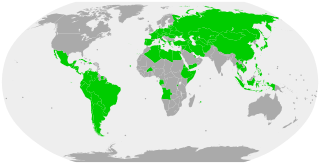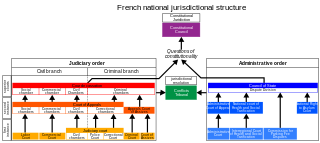| This article is part of a series on | ||||||||
| Corporate law | ||||||||
|---|---|---|---|---|---|---|---|---|
 | ||||||||
By jurisdiction | ||||||||
| ||||||||
French company law is the law governing corporations incorporated in France or under French corporate law.
| This article is part of a series on |
| Corporate law |
|---|
 |
French company law is the law governing corporations incorporated in France or under French corporate law.
In the wake of the French Revolution in 1791, the right to free registration for all private companies was proclaimed. There was a boom in registrations, but this was followed by a bust in 1793. The law was reversed until 1796 when the principle of free incorporation was established again.
The law was consolidated in Napoleon's Code de commerce of 1807 using a concession system. While previously public companies with special privileges were created by a special act of the state, the Code allowed the companies to be formed according to general company law rules. Specific state permission was still required. Article 33 recognised limited liability for members. [1] The Code de commerce was applicable outside France in Baden and the Prussian Rhine province, and it came to serve as a model for all later European public company statutes. The first German public company statute was the Prussian Act of 1843, five years after the Prussian Act on railway enterprises of 1838. Under the Loi sur les Sociétés of 1867 France adopted a system for free registration of companies. [2]
Administrative law is a division of law governing the activities of executive branch agencies of government. Administrative law includes executive branch rulemaking, adjudication, and the enforcement of laws. Administrative law is considered a branch of public law.

The Delaware General Corporation Law, officially the General Corporation Law of the State of Delaware, is the statute of the Delaware Code that governs corporate law in the U.S. state of Delaware. The statute was adopted in 1899. Since the 1913 anti-corporation reforms in New Jersey under the governorship of Woodrow Wilson, Delaware has become the most prevalent jurisdiction in United States corporate law and has been described as the de facto corporate capital of the United States.

A societas Europaea is a public company registered in accordance with the corporate law of the European Union (EU), introduced in 2004 with the Council Regulation on the Statute for a European Company. Such a company may more easily transfer to or merge with companies in other member states.

The Napoleonic Code, officially the Civil Code of the French, is the French civil code established during the French Consulate in 1804 and still in force in France, although heavily and frequently amended since its inception. Although Napoleon himself was not directly involved in the drafting of the Code, as it was drafted by a commission of four eminent jurists, he chaired many of the commission's plenary sessions, and his support was crucial to its passage into law.

The Securities Act of 1933, also known as the 1933 Act, the Securities Act, the Truth in Securities Act, the Federal Securities Act, and the '33 Act, was enacted by the United States Congress on May 27, 1933, during the Great Depression and after the stock market crash of 1929. It is an integral part of United States securities regulation. It is legislated pursuant to the Interstate Commerce Clause of the Constitution.

A civil code is a codification of private law relating to property, family, and obligations.

A joint-stock company (JSC) is a business entity in which shares of the company's stock can be bought and sold by shareholders. Each shareholder owns company stock in proportion, evidenced by their shares. Shareholders are able to transfer their shares to others without any effects to the continued existence of the company.
A foundation is a type of nonprofit organization or charitable trust that usually provides funding and support to other charitable organizations through grants, while also potentially participating directly in charitable activities. Foundations encompass public charitable foundations, like community foundations, and private foundations, which are often endowed by an individual or family. Nevertheless, the term "foundation" might also be adopted by organizations not primarily engaged in public grantmaking.

A private limited company is any type of business entity in "private" ownership used in many jurisdictions, in contrast to a publicly listed company, with some differences from country to country. Examples include the LLC in the United States, private company limited by shares in the United Kingdom, GmbH in Germany and Austria, Besloten vennootschap (BV) in The Netherlands and Belgium, société à responsabilité limitée (SARL) in France, società a responsabilità limitata (S.r.l.) in Italy, and sociedad de responsabilidad limitada (SRL) in the Spanish-speaking world. The benefit of having a private limited company is that there is limited liability.

Civil law is a legal system rooted in the Roman Empire and was comprehensively codified and disseminated starting in the 19th century, most notably with France's Napoleonic Code (1804) and Germany's Bürgerliches Gesetzbuch (1900). Unlike common law systems, which rely heavily on judicial precedent, civil law systems are characterized by their reliance on legal codes that function as the primary source of law. Today, civil law is the world's most common legal system, practiced in about 150 countries.

Corporate law is the body of law governing the rights, relations, and conduct of persons, companies, organizations and businesses. The term refers to the legal practice of law relating to corporations, or to the theory of corporations. Corporate law often describes the law relating to matters which derive directly from the life-cycle of a corporation. It thus encompasses the formation, funding, governance, and death of a corporation.
Traffic codes are laws that generally include provisions relating to the establishment of authority and enforcement procedures, statement of the rules of the road, and other safety provisions. Administrative regulations for driver licensing, vehicle ownership and registration, insurance, vehicle safety inspections and parking violations may also be included, though not always directly related to driving safety. Violations of traffic code are often dealt with by forfeiting a fine in response to receiving a valid citation. Other violations, such as drunk driving or vehicular homicide are handled through the criminal courts, although there may also be civil and administrative cases that arise from the same violation. In some jurisdictions, there is a separate code-enforcement branch of government that handles illegal parking and other non-moving violations. Elsewhere, there may be multiple overlapping police agencies patrolling for violations of state or federal driving regulations.

France's independent court system enjoys special statutory protection from the executive branch. Procedures for the appointment, promotion, and removal of judges vary depending on whether it is for the ordinary or the administrative stream. Judicial appointments in the judicial stream must be approved by a special panel, the High Council of the Judiciary. Once appointed, career judges serve for life and cannot be removed without specific disciplinary proceedings conducted before the council with due process.

An eingetragener Verein, abbreviated e.V., is a legal status for a registered voluntary association in Germany. While any group may be called a Verein, registration as eingetragener Verein confers many legal benefits, because it confers the status of a juridical person rather than just a group of individuals. The legal status must be mentioned in the name as well. Like certain other corporate bodies, an eingetragener Verein can apply for the status of a charitable organization.

Vehicle registration plates are mandatory number plates used to display the registration mark of a vehicle registered in France. They have existed in the country since 1901. It is compulsory for most motor vehicles used on public roads to display them.

French law has a dual jurisdictional system comprising private law, also known as judicial law, and public law.

German company law (Gesellschaftsrecht) is an influential legal regime for companies in Germany. The primary form of company is the public company or Aktiengesellschaft (AG). A private company with limited liability is known as a Gesellschaft mit beschränkter Haftung (GmbH). A partnership is called a Kommanditgesellschaft (KG).

The politics of France take place within the framework of a semi-presidential system determined by the French Constitution of the French Fifth Republic. The nation declares itself to be an "indivisible, secular, democratic, and social Republic". The constitution provides for a separation of powers and proclaims France's "attachment to the Rights of Man and the principles of National Sovereignty as defined by the Declaration of 1789".

Grenadian nationality law is regulated by the 1973 Grenadian Constitution, as amended; the Citizenship Act of 1976, and its revisions; and various British Nationality laws. These laws determine who is, or is eligible to be, a national of Grenada. Grenadian nationality is typically obtained either on the principle of jus soli, i.e. by birth in Grenada; or under the rules of jus sanguinis, i.e. by birth abroad to parents with Grenadian nationality. It can also be granted to persons with an affiliation to the country, or to a permanent resident who has lived in the country for a given period of time through naturalisation. There is also, currently a program in Grenada for persons to acquire nationality through investment in the country. Nationality establishes one's international identity as a member of a sovereign nation. Though it is not synonymous with citizenship, for rights granted under domestic law for domestic purposes, the United Kingdom, and thus the Commonwealth, have traditionally used the words interchangeably.